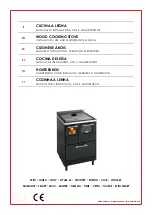
Fig #5
Fig #6
Non-combustible floor protector
Non-combustible floor protector
16" [406mm]
8" [203mm]
8" [203mm]
U.S.A. Only
8" [203mm]
18" [457mm]
8" [203mm]
8" [203mm]
Canada Only
Minimum Width - 43”(1.09m)
Minimum Overall Depth - 50 1/2(1.28m)
Minimum Width - 36”(914mm)
Minimum Overall Depth - 40 1/2 (1.03m)
The stove may be installed on a combustible
floor provided noncombustible ember
protection is used.
This protection must extend as follows:
In Canada: 18" (457 mm) on the firing side
and 8" (203 mm) to the other sides. See
Figure #5 on left.
In USA: 16" (406 mm) to the front and 8"
(203 mm) to the sides of the fuel loading
door opening. See Figure #6 on right.
This protection is also required under the
chimney connector and 2" (51 mm) beyond
each side.
Intake or combustion air can be supplied to the stove in one of two ways. Consult your local
building code or CAN/CSA-B365, Installation Code for Solid-Fuel-Burning Appliances and
Equipment before proceeding.
1.
Outside air supply
- (Necessary for mobile home installation, optional for residential
installation.) To draw outside air through the floor, cut or drill a 4"(100mm) diameter hole
directly below the bottom hole of the ash box enclosure(see page 6 Fig. #1a). Connect
enclosure to the floor with a short 4"(100mm) diameter pipe.
This hole must get its air from a
ventilated
crawl space or be extended with duct to the
outdoors (see Figure #4, Page 10). The use of outside combustion air for residential
installation requires the unit to be secured to the structure to prevent dislodging of the
air duct.
Not e:
When installed in a mobile home, this unit is not designed to be operated with the
firing door open. In addition to the obvious hazard of sparks landing on combustibles,
an open fire door will cause the heater to draw air from the living space and possibly
cause suffocation.
2.
Room air supply
-There is a 4"(100mm) opening in the ash box enclosure. The stove
will draw its air from the room through this opening and into the firebox intake.
Note:
The living space around the heater must be well ventilated with good air circulation.
Anything that may cause a negative pressure can cause gases or fumes to be pulled
into the living area. During extremely cold weather, and especially when burning at very
slow rates, the upper parts of the exposed chimney may ice up, partially blocking the
flue gases. If blockage occurs, flue gases may enter living space.
190617-24 AL6B
©PACIFIC ENERGY FIREPLACE
PRODUCTS LTD.
12
Floor Protector
Combustion Air










































